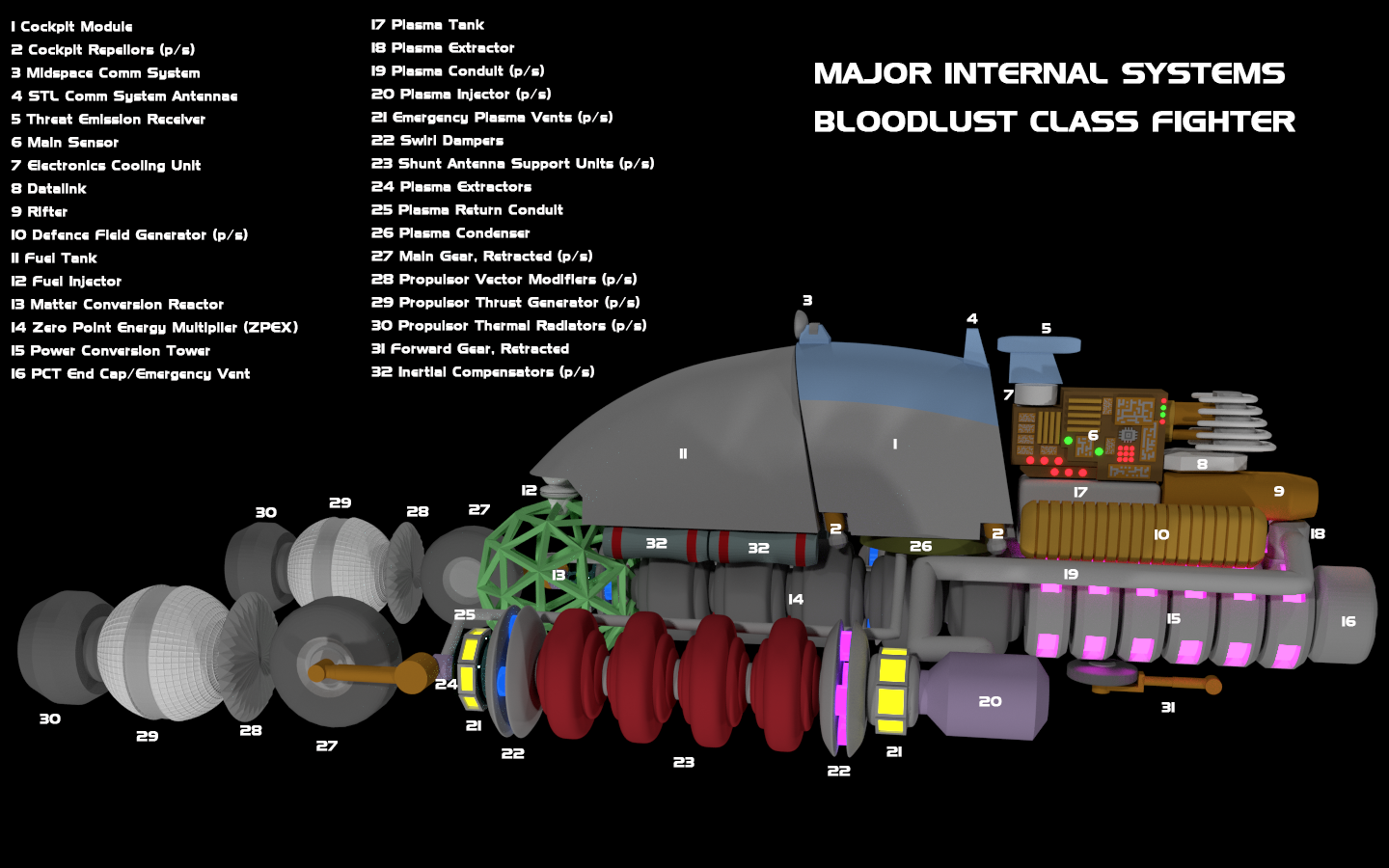This was soooo hard. Big, big, BIG difference between drawing internal bits and pieces in 2D and doing it in 3D. Turns out a lot of things don't quite fit right when you add that pesky third dimension!

The way the power system works : There's essentially two overlapping loops here.
First, fuel in the fuel tank flows down through the injector into the reactor, where it's turned to energy in the form of hard gamma. That goes forward into the ZPEX unit where it's used to power a zero point system that multiplies the energy manyfold. The Coalition isn't at a point where it can run a pure zero point power source as yet, so the matter conversion system runs as a kind of "starter motor" for the zero point system. Only you have to keep running your starter motor all the time, with the zero point system producing energy out in direct proportion to energy in - if your ZPEX is designed with a multiplier of 10,000, then putting 1 TW in results in 10,000 TW coming out, and so on. There are limits to that, though - you have to put a certain amount of energy into the ZPEX just to get it going, so if you throttle the power down below that threshold then the whole power system will "stall" and stop working. And you can't just run it infinitely hot, either, because sooner or later the containment fields inside won't be able to contain the energy any more, and the physical body of the ZPEX unit itself will start to melt.
Once boosted, the energy goes forward into the power conversion tower, where it overlaps with the second loop.
The plasma tank is a big tank of gas sitting above the conversion core. Gas is injected into the core where the energy from the ZPEX heats it to unholy high temperatures as it passes down the core. An extractor at the end of the core then pulls the superhot plasma out and feeds it down the conduits to the shunts on either side. There's also an end cap on the conversion tower, which is a safety device - if something goes wrong, vents in the cap open and plasma blows out away from the fighter. Which means that the fighter isn't blown to bits when the power system goes bad. Hopefully. Maybe. Possibly. On a good day. If you're lucky.
In the shunt, the hot plasma going into an injector that squirts it into the shunt. There's a ring of vents which allow the plasma to be vented before it reached the antenna itself. Then there's a swirl damper that splits the flow up and damps out any turbulence in it before directing it into the shunt antenna itself.
You can't see the antenna - you'd need a microscope to see it, because it's a tiny tube of neutronium running front to back. The red things are field generators made of exotic matter; they generate a field that holds the neutronium antenna in place and keeps it contained. (Contrary to much sci-fi, neutonium would explode rather violently if you just had it sitting there.) Focusing a vast amount of energy into a tiny, tiny amount of space produces resonances in the neutronium which generates the midspace drive field. Tiny adjustments in the diameter and thickness of the neutronium tube fluctuate the field, allowing you to control acceleration, braking, turning, etc.
At the other end there's another swirl damper and another ring of vents - smaller this time, because the plasma has lost almost all of its energy to generating the field as it passes down the shunt. Then a plasma extractor sends the cold plasma into another conduit - again smaller, because it doesn't have to contain super-hot plasma. Then it goes into a condenser, which cools it back into a gas and returns it to the plasma tank. And that's loop two.


















